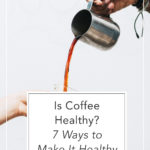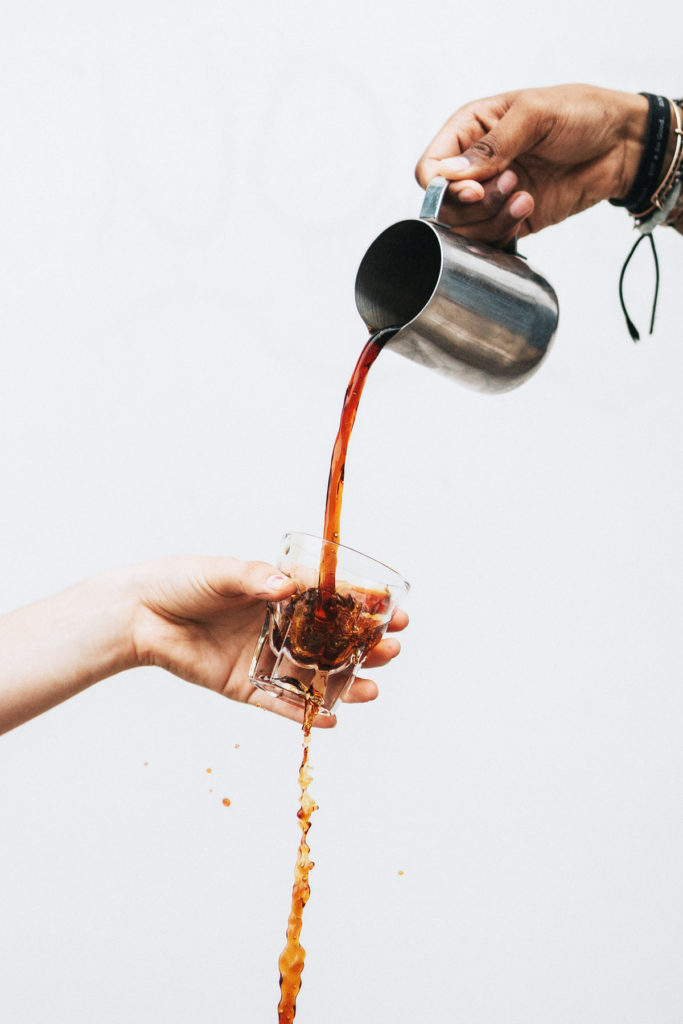Are you nervous reading this? I know you love your coffee and don’t want to give it up. So I’m going to answer the question is coffee healthy and give you a few ways you can potentially keep it in your diet. But I’ll let you in on the secret early. That’s learning how to enjoy it without relying on it as a life source.
The answer to is coffee healthy is – it’s complicated.
So here’s what you need to know. How healthy is coffee?
Coffee has a unique mix of antioxidants and bioactive compounds that can significantly help the body. Bringing with them many different health claims surrounding coffee, including its effect on cancer risk, premature aging, and cognitive decline. No surprise, it has also been shown to be the leading source of antioxidants in the American diet.
Which happens to be a perk as well as a red flag.
Yes, coffee contains a mix of antioxidants, just like other produce sources, but it also comes with its own risk (unlike an apple). Meaning, you cannot classify coffee in the same nutrient group as other produce options because it also contains elements that decrease the health properties.
The risk with coffee comes from caffeine. In a healthy body, caffeine has relatively little effect. But in an out-of-balance body, it amplifies the immune response leading to excess inflammation. Plus, caffeine is an addictive substance that alters the body’s internal chemistry, including hormonal flow and neurotransmitter release.
If it sounds like I’m talking in circles, the research behind coffee appears the same. Some call it good, and others call it bad.
Foods cannot be labeled as good or bad.
But, like all foods, it’s hard to label as good or bad simply because some people are better at digesting and eliminating caffeine than other people, changing the function in the body. So while it may act as an excellent anti-aging antioxidant in one person, it can lead to a drastic decline in health in another.
Some of this is linked to a gene in a percentage of the population that makes caffeine metabolism difficult. And if you can’t metabolize it, it will build up in the body, changing your neurotransmitter and hormonal response.
That’s because caffeine is a stimulant. Like all stimulants, they are considered toxins to the body in high doses. Of course, it gives you energy, but more energy doesn’t always equal better. Too much energy throws your body out of balance, inducing a fight or flight response like any other stress on the body.
When this happens, you also stimulate an inflammatory release, store more body fat and decrease the overall ‘feel’ of energy.
Meaning that cup of coffee you were drinking to give you energy can tank your energy, leaving you ‘needing’ more.
Leading to the answer to the question, is coffee healthy?
Is coffee healthy?
If you need a cup of coffee or a hit of caffeine to make it through your day, no, it’s not healthy. It signifies your body is out of balance. Leaving you stuck in a state of survival, unable to allow your body to rest and relax.
Or if you’re suffering from an autoimmune disease, a hormonal imbalance, or are struggling to lose weight, it’s also a great time to work yourself through a coffee reset.
On the flip side, if you enjoy the taste but don’t need it and you can stop yourself after one cup, go ahead and enjoy it.
If you said you need it, don’t worry, there is a way to get yourself to a place to enjoy it again. But this means healing your energy and creating balance inside of your body. It also means skipping any added caffeine sources allowing your body space to enter into deep healing. And that is done by learning how to fix your energy without adding caffeine through a caffeine detox.
Take this quiz to find out if you need a caffeine detox.
A caffeine detox may sound unsettling, even impossible, but think of it as body training. Training your body to use natural energy rather than artificial energy produced by caffeine. We’ll talk caffeine detox at the end of this post, but for now, here are a few ways to make coffee work for you.
1. Buy a high-quality coffee brand.
Coffee brands vary greatly in quality. Coffee is known to be one of the top-containing mycotoxin foods. Meaning it’s highly moldy. The mycotoxin level can vary based on how it is processed, but if you’re buying a brand of coffee high in mycotoxins, even if you can handle caffeine, is it going to hurt your body. Opt for high-quality brands and do your research. Here is a list of safe, high-quality coffee brands.
2. Skip caffeine-free options.
It may seem like the obvious solution, enjoy your coffee but sans caffeine. The problem is, the removal of caffeine happens through a chemical process. A chemical process that creates toxins just as harmful, if not more, than the caffeine itself. If you’re going to drink coffee, keep the caffeine.
3. Drink it with a meal or add fat.
Bulletproof coffee became a rage when Dave Asprey added a pat of butter and a scoop of collagen to aid in the health of coffee. While it seems strange, it is pretty beneficial. That is because the fat and protein help slow the absorption of caffeine entering your body, making it easier to digest and process. However, I still prefer coffee with a meal as it has been shown to increase the absorption and usage of the antioxidants coffee contains.
4. Skip the sugar.
We all know that added sugar only amplifies all problems and adding it to your coffee, while popular, is no different. In fact, it’s doing double duty on spiking your energy levels with a glucose spike followed by a drop. One that leaves you tired, out of energy, and looking for more caffeine. If you’re going to drink it, steer clear of the sugar and opt instead to drink it with a meal.
5. No coffee after midday.
Your hormones are changing with the changing of the sun patterns. This is called your circadian rhythm, and it’s essential in regulating your homeostasis (body’s balance). To work with your circadian rhythm, skip caffeine after noon (2:00 pm at the latest). This keeps your hormone flow in check, allowing the body time to cycle through its regular circadian clock.
6. Skip the caffeine chasers.
Back-to-back coffee takes the stress level up a notch. So avoid chasing one cup of coffee with another. Instead, allow at least two hours between cups for your body to properly metabolize, digest, and excrete the first round of caffeine before overloading it with another one.
7. Learn to enjoy the smallest size
You don’t need a lot. Learning to be a sucker for high-quality, expensive coffee enjoyed in small doses is the key. Don’t take a good thing and make it bad by overdoing it. Instead, work to drink less until you find an amount that satisfies that inner drive while preventing the overconsumption leading to a crash.
Try a caffeine detox.
I’m not saying it has to be forever. Most people at some point or another are going to enjoy a shot of caffeine more often than not because they like the flavor of the beverage rather than needing the caffeine. But to get there, you need to get rid of the caffeine dependency and remind your body it has plenty of energy inside.
You just need to re-learn how to live that out—enhancing your natural energy stores and creating space for your body to do the deep healing.
Try it out. Take five days, free of caffeine.
It may seem like a lot, you may get a headache or become extremely fatigued, but this will pass. If nothing, it will show you how dependent you are on an external substance working against your body.
Once you’re done with the detox, add a small, high-quality coffee back in and take note of how you feel. Is it working for you?
If yes, then keep it slow and don’t overindulge. You don’t want to take a good thing and turn it bad. But if you’re feeling tired, sluggish, bloated, or anxious after a cup, it’s not for you.
That doesn’t mean you can’t learn to equally love something else, if not enjoy it even more.

